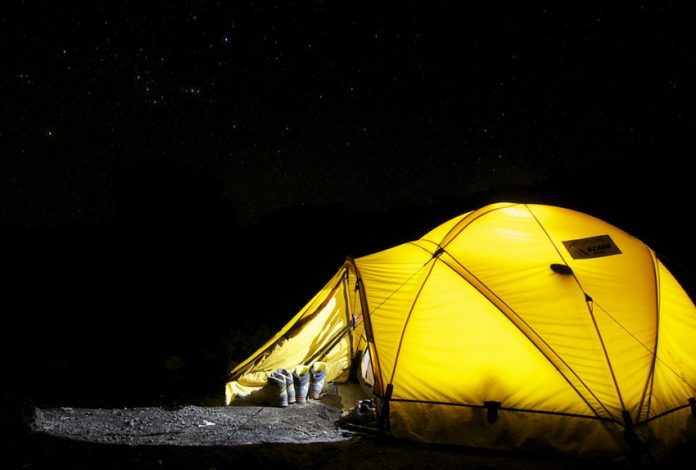From a “macro” perspective, the general principles of camping are relatively simple. More than anything else, it’s a matter of adaptation and acclimation to living outdoors rather than within four walls. Regardless, there are a multitude of tips and tricks to help make that transition easier, and allow your time spent camping to be more relaxing and enjoyable.
General Outdoor Tips
The tent is the focal point of most camping trips. If you’re a beginning camper, there are a couple of different tent tips to remember. First and foremost, practice pitching your tent before you head to the campsite. Being able to do it quickly and effectively is extremely valuable. When looking for a place to set up, always look for a “natural bed” of soft, flat soil – but avoid the bottom of hills or valleys. Finally, always set up a tarp below your tent to avoid potential damage or water-logging.
Campers can also benefit from a few non-specific outdoor principles. Rule number one, no matter the time of year, is to dress in (or at least carry) layers. It’s the easiest and most effective way to control your body temperature. Secondly, learn how to use a GPS or map and compass. No matter how familiar you are with a certain wooded area, getting lost among acres of similar-looking trees is very easy. Finally, practice basic outdoor skills such using and sharpening a utility knife, tying various knots, and building a fire. It’s this knowledge that separates the amateurs from the seasoned campers.
What to Bring on a Camping Trip
With any luck, each camping trip proves to be a unique experience. There are many wonderful things that nature has to offer. But, no matter where you’re headed, a few things should always come with you. Below is the “short list” of camping essentials that should always be packed.
- A Tent, Tarp, and Sleeping Bag
- A pot, pan, dishes, utensils, and fire-starting materials (preferably waterproof matches or a butane lighter)
- A utility knife and length of rope
- Plenty of water (get gallon sizes for cooking and cleaning)
- Energy rich, easily prepared foods and snacks (think items like pasta, beans, ground beef, peanut butter, chicken, trail mix, and oatmeal)
- Plenty of clothing (a good rule of thumb in temperate areas is enough for two to three layers daily)
- A tight-closing cooler to store your food items in
- Hand sanitizer and soap
- Optionally, outdoor gear like fishing poles and hiking equipment
How to Budget for a Camping Trip
Like most anything else, budgeting for a camping trip is easiest when you start big and work your way down. First, decide upon an amount you can afford, and make a resolution not to exceed it. Then, begin to factor in the larger expenses – things like food, gas, necessary equipment, and campsite fees. From there, work your way down to smaller items until you come close to the spending limit.
As that line is tested, you’ll have to make the nitpicky decisions that ultimately determine your trip’s bottom line. For instance, you could eliminate that traditional fast food stop on the way there in favor of pre-prepared sandwiches. Little decisions such as these tend to add up in the grand scheme of financial matters, especially when it comes to discretionary spending.
Now that you know the basics of camping, what to bring, and how to squeeze outdoor adventure into your budget, nothing is left to keep you from hitting the woods! If you’re interested in more detailed information, take a look at the links below for some specific advice on the more nuanced aspects of camping.
Camp life is made easier by gaining experience and learning the tricks. Here are some great camping tips and advice to help make your camping adventures more enjoyable.


